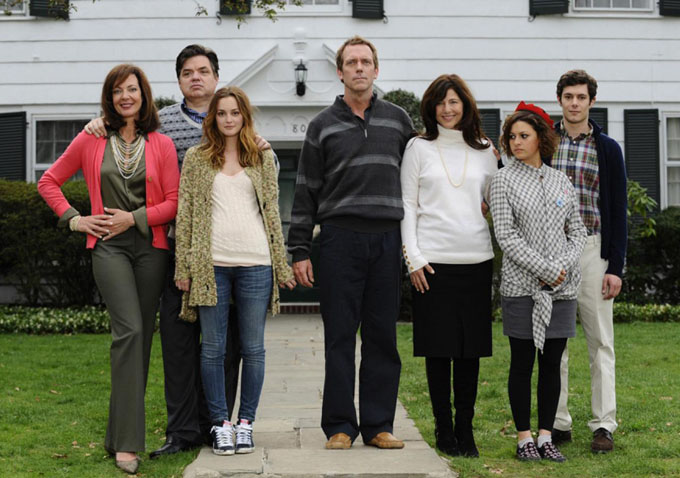 There’s another era that would have welcomed the chaste suburban sex comedy “The Oranges.” In an earlier time, this mock-revealing story of two families coming apart due to infidelity would have seemed appalling, transgressive. Perhaps as a low-heat exploitation picture threatening to expose the chaos and lack of identity underneath the perfect suburban exterior. Maybe as a sobering drama about two groups of adults at an impasse between the intensity of their feelings, and the acceptable social mores which they must battle. But you review the movie that you’ve gotten, and “The Oranges” is neither of these films.
There’s another era that would have welcomed the chaste suburban sex comedy “The Oranges.” In an earlier time, this mock-revealing story of two families coming apart due to infidelity would have seemed appalling, transgressive. Perhaps as a low-heat exploitation picture threatening to expose the chaos and lack of identity underneath the perfect suburban exterior. Maybe as a sobering drama about two groups of adults at an impasse between the intensity of their feelings, and the acceptable social mores which they must battle. But you review the movie that you’ve gotten, and “The Oranges” is neither of these films.
The Ostroffs and the Wallings are both well-to-do middle class citizens and community fixtures, both couples with college-age children, both with their own shared hobbies and quirky eccentricities. Carol and Terry Ostroff (Allison Janey, Oliver Platt) keep busy, wondering when world-traveling daughter Nina (Leighton Meester) will return, if only to suffer through her pedestrian nags and his childlike fascination with costly, inefficient gizmos. Paige and David Walling (Catherine Keener, Hugh Laurie), meanwhile, share longing kisses even as he slaves away in his officer and she holds tyrannical sway over a series of community activities.
 The film settles in for a first act that’s effectively hang-out time with our characters, none of whom seem all that compelling. The point of view, and occasional narration, emerges from Paige and David’s struggling daughter Vanessa (Alia Shawkat), who shlumps in hoodies and generally disdains both her surroundings and the fact that she remains reliant on her folks. A valid perspective, but one the movie dodges almost whole-heartedly — the second act ditches her narration altogether, and she becomes the least-active member of the cast, slinking away at moments of conflict, her conflict reduced to the film’s C-story.
The film settles in for a first act that’s effectively hang-out time with our characters, none of whom seem all that compelling. The point of view, and occasional narration, emerges from Paige and David’s struggling daughter Vanessa (Alia Shawkat), who shlumps in hoodies and generally disdains both her surroundings and the fact that she remains reliant on her folks. A valid perspective, but one the movie dodges almost whole-heartedly — the second act ditches her narration altogether, and she becomes the least-active member of the cast, slinking away at moments of conflict, her conflict reduced to the film’s C-story.
Instead, Nina returns home, responding to the end of a bad relationship by immediately making a move for David. It feels as if huge chunks are missing from “The Oranges” — Nina initially seems very sex-forward, indulging in this illicit dalliance for the thrill, until the assumption is revealed that she’s actually developed feelings for him. Surprising as well is that he’s grown tired of his marriage, emotions unrevealed because of the film’s coy approach to sex (we see nothing). Thus, makeout sessions are meant to reflect David’s honest emotions, as he isn’t awarded a chance to express what this means to him and her.
 This twist severs the friendship between David and Terry as well as Carol and Paige, but the escalation is neither broad comedic violence, emotional or otherwise, or slow-burning anger. Instead, characters spout their feelings off the top of their head, giving the actors a few choice Acting Moments© without the benefit of actual characterization. The main crux becomes the romance (even though Vanessa has already provided a reasonable POV), but it’s built entirely out of assumption, leaving the narrative spinning the wheels. For a very long time in “The Oranges,” nothing happens, despite the potential juiciness of this predicament, primarily set during the holidays because neighborly resentment seems funnier with snow on the ground.
This twist severs the friendship between David and Terry as well as Carol and Paige, but the escalation is neither broad comedic violence, emotional or otherwise, or slow-burning anger. Instead, characters spout their feelings off the top of their head, giving the actors a few choice Acting Moments© without the benefit of actual characterization. The main crux becomes the romance (even though Vanessa has already provided a reasonable POV), but it’s built entirely out of assumption, leaving the narrative spinning the wheels. For a very long time in “The Oranges,” nothing happens, despite the potential juiciness of this predicament, primarily set during the holidays because neighborly resentment seems funnier with snow on the ground.
In one of his many small performances each year in indies no one watches, Adam Brody shows up as Toby, David and Paige’s successful globe-trotting son, groomed to eventually be Nina’s suitor. He’s introduced via his stilted corporate-speak, self-conscious wardrobe, and general obliviousness, his first impression also becoming his last. He fails to deepen as these calamities occur around him, instead reacting incredulously from behind his Upper Class obnoxiousness. Partly due to the actor (Brody is almost always unconvincing) and partly due to the writing, Toby emerges as a fully formed, one-dimensional construct, evidence of filmmakers learning Act One screenwriting, pivotal for television, and not appropriate for the movies. Unfortunately, there are few screens small enough to properly convey how inessential another deadpan suburbs satire is in 2012. [D]
For another take on the film, here's our review from the 2011 Toronto International Film Festival.

